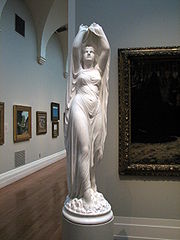
Elemental
Encyclopedia

Alchemy
Alchemy is an influential philosophical tradition whose early practitioners’ claims to profound powers were known from antiquity. The defining objectives of alchemy are varied; these include the creation of the fabled philosopher's stone possessing powers including the capability of turning base...
works of Paracelsus
Paracelsus
Paracelsus was a German-Swiss Renaissance physician, botanist, alchemist, astrologer, and general occultist....
in the 16th century. Traditionally, there are four types:
- gnomeGnomeA gnome is a diminutive spirit in Renaissance magic and alchemy, first introduced by Paracelsus and later adopted by more recent authors including those of modern fantasy literature...
s, earth elementals - undines (also known as nymphs)Ondine (mythology)Undines , also called ondines, are elementals, enumerated as the water elementals in works of alchemy by Paracelsus. They also appear in European folklore as fairy-like creatures; the name may be used interchangeably with those of other water spirits. Undines are said to be able to gain a soul by...
, water elementals - sylphSylphSylph is a mythological creature in the Western tradition. The term originates in Paracelsus, who describes sylphs as invisible beings of the air, his elementals of air...
s, air elementals - salamandersSalamander (legendary creature)The salamander is an amphibian of the order Urodela. As with many real creatures, pre-modern authors often ascribed fantastic qualities to it , and in recent times some have come to identify a legendary salamander as a distinct concept from the real organism. This idea is most highly developed in...
, fire elementals.
The exact term for each type varies somewhat from source to source, though these four are now the most usual. Most of these beings are found in folklore
Folklore
Folklore consists of legends, music, oral history, proverbs, jokes, popular beliefs, fairy tales and customs that are the traditions of a culture, subculture, or group. It is also the set of practices through which those expressive genres are shared. The study of folklore is sometimes called...
as well as alchemy; their names are often used interchangeably with similar beings from folklore. The sylph, however, is rarely encountered outside of alchemical contexts and fan media.
To this day, many people still believe in Elementals: those who work in Witchcraft and/or follow Nature-based Religions.
The basic concept of an elemental refers to the ancient idea of elements as fundamental building blocks of nature. In the system prevailing in the Classical
Classical antiquity
Classical antiquity is a broad term for a long period of cultural history centered on the Mediterranean Sea, comprising the interlocking civilizations of ancient Greece and ancient Rome, collectively known as the Greco-Roman world...
world, there were four elements: fire, earth, air, and water. This paradigm was highly influential in Medieval
Middle Ages
The Middle Ages is a periodization of European history from the 5th century to the 15th century. The Middle Ages follows the fall of the Western Roman Empire in 476 and precedes the Early Modern Era. It is the middle period of a three-period division of Western history: Classic, Medieval and Modern...
natural philosophy
Natural philosophy
Natural philosophy or the philosophy of nature , is a term applied to the study of nature and the physical universe that was dominant before the development of modern science...
, and Paracelsus evidently intended to draw a range of mythological beings into this paradigm by identifying them as belonging to one of these four elemental types.
See also
- Classical elementClassical elementMany philosophies and worldviews have a set of classical elements believed to reflect the simplest essential parts and principles of which anything consists or upon which the constitution and fundamental powers of anything are based. Most frequently, classical elements refer to ancient beliefs...
s - Elements in fiction
- Faerie, mythological being
- GnomeGnomeA gnome is a diminutive spirit in Renaissance magic and alchemy, first introduced by Paracelsus and later adopted by more recent authors including those of modern fantasy literature...
- SalamanderSalamander (legendary creature)The salamander is an amphibian of the order Urodela. As with many real creatures, pre-modern authors often ascribed fantastic qualities to it , and in recent times some have come to identify a legendary salamander as a distinct concept from the real organism. This idea is most highly developed in...
- SylphSylphSylph is a mythological creature in the Western tradition. The term originates in Paracelsus, who describes sylphs as invisible beings of the air, his elementals of air...
- UndineOndine (mythology)Undines , also called ondines, are elementals, enumerated as the water elementals in works of alchemy by Paracelsus. They also appear in European folklore as fairy-like creatures; the name may be used interchangeably with those of other water spirits. Undines are said to be able to gain a soul by...

